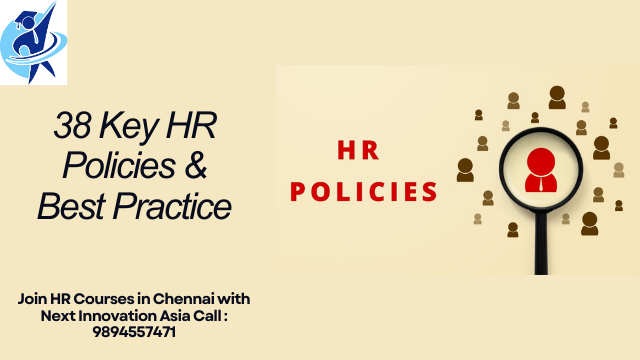Certainly! Developing comprehensive Human Resources (HR) policies is essential for creating a healthy work environment and ensuring legal compliance. Here’s a list of 38 key HR policies and best practices that organizations may consider implementing:
- Equal Employment Opportunity (EEO) Policy:
- Ensure fair treatment and prohibit discrimination in all employment practices.
- Anti-Harassment Policy:
- Establish a zero-tolerance approach to any form of harassment, including sexual harassment, bullying, and discrimination.
- Code of Conduct:
- Outline the expected behavior of employees to maintain a positive workplace culture.
- Dress Code Policy:
- Specify appropriate attire for the workplace, ensuring professionalism.
- Attendance and Punctuality Policy:
- Define expectations regarding attendance, punctuality, and reporting absences.
- Employee Classification Policy:
- Clearly define the classification of employees, such as full-time, part-time, temporary, or contract.
- Work Hours and Overtime Policy:
- Specify regular work hours, breaks, and the process for approving overtime.
- Telecommuting and Remote Work Policy:
- Establish guidelines for employees working remotely, including expectations and communication protocols.
- Leave of Absence Policy:
- Outline the types of leaves available, such as sick leave, vacation, parental leave, and the process for requesting time off.
- Family and Medical Leave Act (FMLA) Policy:
- Comply with legal requirements for providing job-protected leave for eligible employees.
- Performance Management Policy:
- Define the performance appraisal process, including goal-setting, feedback, and development plans.
- Training and Development Policy:
- Support employee growth through training opportunities and professional development programs.
- Promotion and Internal Mobility Policy:
- Establish criteria and processes for internal promotions and job transfers.
- Employee Recognition and Rewards Policy:
- Recognize and reward employees for outstanding performance and contributions.
- Employee Grievance Policy:
- Provide a formal process for employees to address and resolve workplace concerns.
- Whistleblower Policy:
- Encourage employees to report unethical behavior without fear of retaliation.
- Conflict of Interest Policy:
- Address potential conflicts of interest and outline disclosure requirements.
- Data Privacy and Confidentiality Policy:
- Ensure the protection of sensitive company and employee information.
- Social Media and Electronic Communication Policy:
- Establish guidelines for the appropriate use of social media and electronic communication in the workplace.
- Drug and Alcohol Policy:
- Address the use of drugs and alcohol in the workplace, including testing procedures.
- Safety and Emergency Procedures Policy:
- Outline safety protocols, emergency procedures, and evacuation plans.
- Workplace Violence Prevention Policy:
- Promote a safe and secure workplace by addressing and preventing violence.
- Anti-Bribery and Anti-Corruption Policy:
- Ensure compliance with laws and regulations related to bribery and corruption.
- Tuition Reimbursement Policy:
- Support employees pursuing further education by offering tuition reimbursement.
- Flexible Work Arrangements Policy:
- Provide guidelines for flexible work schedules or alternative work arrangements.
- Compensation and Benefits Policy:
- Clearly communicate the organization’s approach to salary, bonuses, and employee benefits.
- Health and Safety Policy:
- Promote a healthy and safe working environment, including guidelines for ergonomics.
- Employee Handbook Acknowledgment Policy:
- Require employees to acknowledge receipt and understanding of the employee handbook.
- Social Responsibility Policy:
- Demonstrate the organization’s commitment to ethical and socially responsible business practices.
- Technology Usage Policy:
- Define acceptable use of company technology, including computers, email, and internet access.
- Non-Disclosure Agreement (NDA) Policy:
- Protect confidential information through the use of NDAs when necessary.
- Travel and Expense Reimbursement Policy:
- Outline the process for submitting and reimbursing business-related expenses.
- Employee Exit Process Policy:
- Provide guidelines for the smooth exit of employees, including exit interviews and return of company property.
- Succession Planning Policy:
- Develop a strategy for identifying and grooming employees for future leadership roles.
- Employee Wellness Program Policy:
- Promote employee well-being through wellness initiatives and programs.
- Community Engagement Policy:
- Encourage employee involvement in community service and charitable activities.
- Global Mobility Policy:
- Address policies and procedures for employees working across international borders.
- Inclusive and Diversity Policy:
- Promote an inclusive and diverse workplace, fostering a culture of equality and respect for all.
Remember, these policies should be regularly reviewed and updated to align with changes in the business environment, laws, and industry best practices. Additionally, organizations should communicate these policies clearly to all employees and provide training as needed to ensure understanding and compliance.

